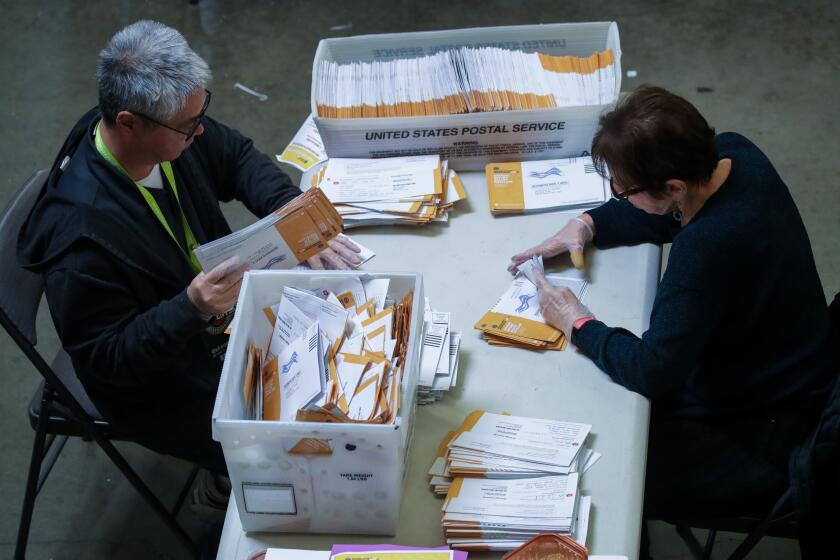Immigration reform: The Utah path
Among immigration reform advocates, it’s an article of faith: Only the federal government, not the states, can fix the immigration system. These reformers aren’t wrong. Ultimately, only Washington can control the nation’s borders or set standards for citizenship, and a patchwork of 50 different laws dealing with illegal immigrants isn’t likely to work for anyone.
But it has now been 10 years — 10 years! — since President George W. Bush first promised to make immigration reform a priority in Washington. Bush has come and gone. Congress has tried and failed. A new president has come into office, and promised and failed. So maybe it’s time to try a different approach, if only to break the logjam.
The state of Utah showed the way this month, passing a package of three immigration bills that cover all three bases most reform advocates agree need to be covered by any fix: tougher enforcement, a guest-worker program to meet the state’s labor needs and an answer — fines and work permits — for the unauthorized immigrants already living and working in Utah.
The package isn’t perfect. It probably isn’t constitutional. The Constitution’s supremacy clause plus 200 years of lawmaking are thought to reserve immigration policymaking for the feds. Certainly, that’s how the courts have ruled for decades — an approach likely to be upheld, perhaps with some loopholes, when the Supreme Court considers the matter this spring.
And the Utah package won’t necessarily solve the state’s immigration problems. It’s hard to see how a standalone state guest-worker program can be effective without federal cooperation; only the feds can issue visas, after all. And Utah’s plan to register unauthorized immigrants is explicitly conditioned on getting a “waiver” from Washington. But no waiver exists, and the Obama administration may not want to invent one. Although the administration supports legalization for illegal immigrants, it also believes that Congress, not Utah, should make immigration law.
Still, when the approach you’re trying doesn’t work, and nothing budges no matter what you do, sometimes you’ve got to try something else — even if it isn’t perfect or constitutional.
In the early decades of the republic, states had more leeway, and many passed their own naturalization laws, deciding who could and could not become a citizen. But by the end of the 19th century, states were out of the immigration game — until 2006, when Congress left a vacuum by failing to pass comprehensive reform and states across the country stepped in to fill it.
Most of these laws were enforcement measures driven by populist politicians and angry voters who hoped they could make life so miserable for illegal immigrants that they would eventually pack up and leave — a theory known as attrition through enforcement.
The first bills focused on making it hard to rent an apartment and get a driver’s license. A second round zeroed in on employers, requiring new worksite background checks and imposing stiff penalties for hiring illegal immigrants. The latest trend, initiated by Arizona’s controversial SB 1070, is to require state and local police to take immigration into their own hands, inquiring about the status of people they stop or arrest for other reasons.
Critics of these laws are surely right: We can’t solve the problem of immigration with enforcement alone. Most illegal immigrants are not going to leave the U.S. voluntarily. And just cracking down will do nothing to fix the legal immigration system; it won’t help the country fill labor needs at the top or the bottom of the economy. But this is where Utah and its three-part package comes in, reaching beyond enforcement toward a more complete solution.
Most immigration reform advocates take a dim view of the Utah breakthrough; for them, the constitutional argument trumps everything.
But what if Utah were to become a national model? What if an array of other states passed balanced bills that combined enforcement with worker visas and an answer for unauthorized immigrants? What if California and New York and Illinois — states likely to pass liberal rather than conservative immigration measures — were to get in on the act?
Of course, in the long run, this would be unworkable. You’d have immigrants who were legal in one place but illegal as soon as they crossed a state line. National and even regional companies would flounder while they tried to navigate divergent laws. This is why the republic developed a strong central government — to impose some measure of consistency on the states and avoid a crazy-quilt pattern of rules.
But that’s the long run. In the short run, a crop of state bills would send a powerful signal to Washington. Utah already has — a shot resonating from coast to coast. One of the most conservative states in the nation, after all, voted to do what Democrats and Republicans in Congress have not done: register and regularize illegal immigrants. Enterprising lawmakers in other states might come up with fresh ideas Washington hasn’t thought of. And eventually, if enough states joined in, they would create a situation so intolerable that even Washington couldn’t ignore it. Hard as it is to imagine, Congress would have to act.
There’s a precedent for this, albeit one not quite as unruly as a wildfire states’ revolt. In the late 1980s, a national consensus emerged: Welfare as we knew it was broken. But Democrats and Republicans differed sharply about what reform should look like, and the national debate stalled. Then, in 1987, Republican Gov. Tommy Thompson of Wisconsin stepped into the breach, requesting a waiver from federal welfare law in order to conduct a state experiment. Within a few years, Congress was debating a bill modeled on Wisconsin’s approach, and in 1996, President Clinton signed welfare reform into law.
Wisconsin then, Utah now? Anyone who wants to fix immigration can only hope so. The status quo is intolerable, and we need a way out of the box.
Tamar Jacoby is president of ImmigrationWorks USA, a national federation of small-business owners advocating immigration reform.
More to Read
A cure for the common opinion
Get thought-provoking perspectives with our weekly newsletter.
You may occasionally receive promotional content from the Los Angeles Times.






